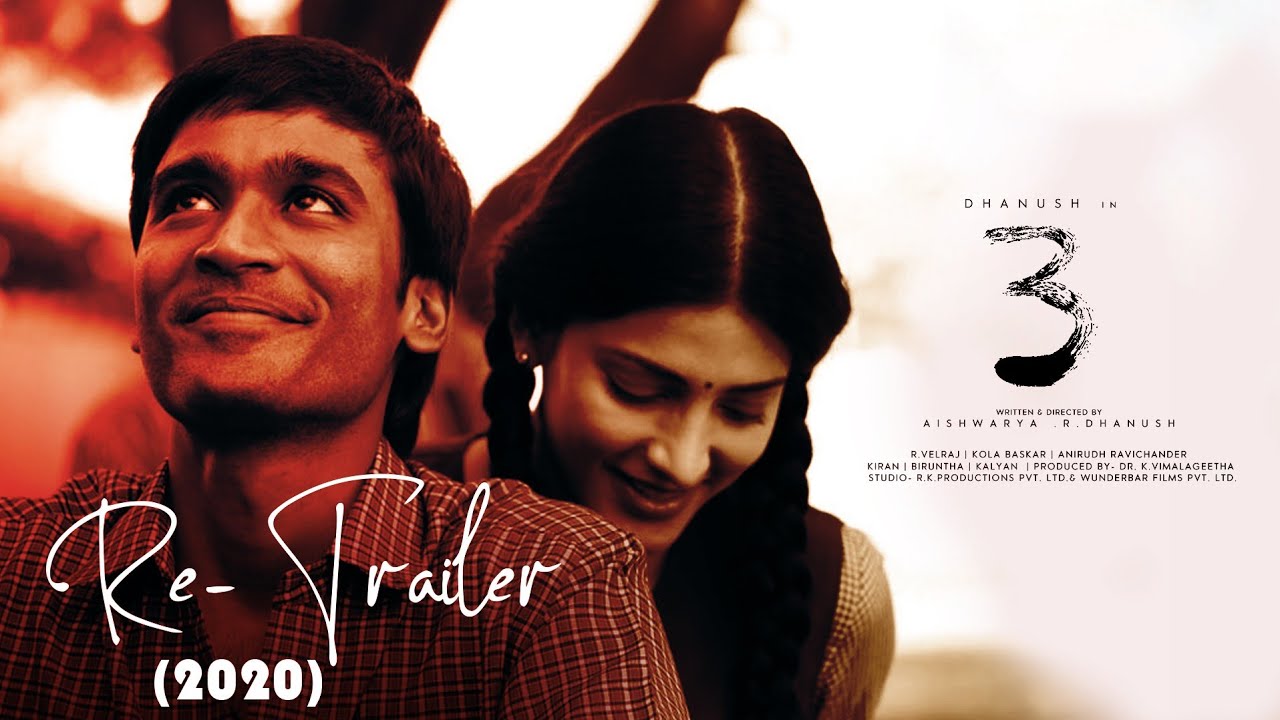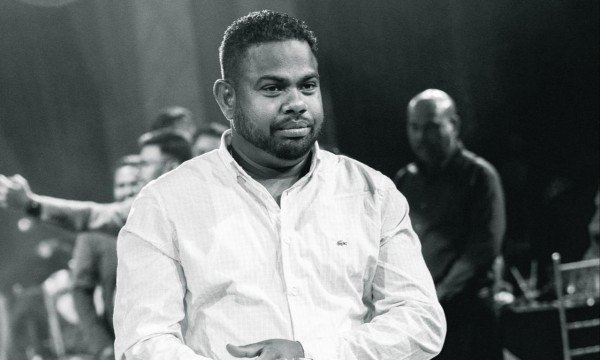
***Picture courtesy of YouTube***
For those who haven’t watched this movie yet – this is your official spoiler alert!
This article is not a review of the film, but an exploration of bipolar disorder as seen in ‘3’ (“Moonu”). The story introduces bipolar disorder to a Tamil audience - most of whom may be unfamiliar or misinformed about this mental health disorder.
Significance of the title “3”
Bipolar disorder (also known as manic-depressive illness) consists of three states: a high or ‘manic’ state, a low or ‘depressive’ state, and a functioning ‘balanced or wellness’ state. There are various forms of the disorder, but it is generally a brain disorder in which affected individuals experience extremes in these moods. This becomes a medical concern as opposed to the regular ‘ups’ and ‘downs’ that most individuals experience. Bipolar disorder affects about 1- 2% of the population WORLDWIDE which is why it’s wonderful that Tamil cinema is raising awareness of this condition.
“Loosu”?
In many minority cultures mental illness is not openly addressed due to factors such as shame and hesitancy to seek support from strangers (even if they are professionals) because of cultural values that emphasizes help-seeking within the family instead. Others might attempt to repress struggles to avoid hurting loved ones and may also be fearful of eliciting judgment. This is clearly evident in the hero’s struggle in “Moonu”. He did not want to ‘burden’ his wife, he was ashamed of his actions, and reluctant to obtain treatment. In reality no one can be forced to obtain treatment UNLESS they are a threat to themselves or others. Biological treatments (medication or ECT etc.) and psychosocial treatments (therapy, rehab, etc.) are available and are proven to be effective in helping to manage the disorder.
So there’s no ‘psycho’ villain?
The movie offers a new perspective on the more familiar notion of the “psycho” villain. The aspect of the “hero” who struggles with this disorder instead, can be helpful in reducing the stigma associated with mental illness in general. Mental illness is not evil in spite of how it is often portrayed. This movie presents a glimpse inside the life of someone with bipolar disorder, and the consequences it can have—strained relationships, poor functioning and sadly, even suicide. By providing this perspective, the story succeeds in provoking feelings of empathy from its audience. Despite being a risk factor, suicide is not a common outcome for individuals with this disorder. But it can sometimes be perceived as the only option for individuals who do not recognize the supports and treatments available. If you can recall, a sentence near the credits of the movie briefly summarizes this idea. My mother believes that the movie should have instead ended with the hero getting the help he needed and everyone supporting him in treatment. But it just wouldn’t be a dramatic Tamil movie any other way, would it?
Why this kolaveri?
To uphold the entertainment value of the movie, there had to be suspense and drama. This reinforced stereotypes that people affected by mental illness are dangerous and to be feared—which is NOT true! Keep in mind that the depiction of Dhanush’s struggles had a lot to do with capturing the interest of the audience and should not be used as a predictor of all individuals who are suffering from this disorder. Individuals with bipolar disorder have only an increased risk of harm to themselves and others ONLY under specific circumstances such as when experiencing psychotic symptoms, not complying with medication, and/or abusing alcohol and other drugs.
I myself provide psychotherapy services to several clients who are suffering from bipolar disorder and in my experiences, I have NEVER felt the need to be fearful, even during bipolar episodes. If someone you know is having an episode, I would suggest that you do not try to reason, argue, or be authoritative (like Senthil’s failed attempts). Instead, try to help reduce stimulation and take steps to ensure safety (even if this means getting outside help).
If you feel that someone you love struggles with bipolar disorder, I recommend that you provide them with emotional support, information, and resources to get them the help that they need. By educating ourselves and by maintaining a non-judgmental stance on mental illness, we can help reduce the stigma and break down this barrier to treatment.
For more information on, and resources about bipolar disorder, check out this guide for patients and families.
**Looking to create your love story? Join the other couples who have dated and got married through myTamilDate.com!***
"myTamilDate.com Love Story: Tharshi & Ravi Found Love During Lockdown"
"How France Met Canada: A MyTamilDate.com Love Story"
***CLICK HERE to listen to us on Spotify!***
Related Articles:
- "The Tamil Creator Podcast (Ep.34): Robert Rajeswaran – Singapore-Based Serial Entrepreneur (Born in Sri Lanka & Raised in London) & Co-Founder of Boxaroo"
- "The Tamil Creator Podcast (Ep.33): Ashanti Omkar - UK-Based BBC Broadcaster & Music/TV/Film Critic"
- "The Tamil Creator Podcast (Ep.32): Amarnath Amarasingam - Hip Hop Aficionado, Assistant Professor, Researcher & Author"
- "The Tamil Creator Podcast (Ep.31): Luksimi Sivaneswaralingam – Award-Winning Kollywood Singer & Elementary School Teacher"
- "The Tamil Creator Podcast (Ep.30): Suresh Doss – Leaving A Successful IT Career To Becoming A Well-Known Food Writer"
- "The Tamil Creator Podcast (Ep.29): Indira Samarasekera - Former University President & Current Board Member (Of Several Large Market Cap Companies), Co-Authors Book To Help Create More Female"
- "The Tamil Creator Podcast (Ep.28): Ari Sooriya - Creative Extraordinaire: From TamilCulture.com to Teacher (And Everything In Between)"
- "The Tamil Creator Podcast (Ep.27): Bindi Bosses (Shyamla Eswaran & Ragavi Ragavan) - Australian-Based Dance Group Creating Social Movvement And Discussions Through Performance & Storytelling"
- "The Tamil Creator Podcast (Ep.26): Rick Selvarajah – UK-Based Professional MMA Fighter Turned Entrepreneur"
- "The Tamil Creator Podcast (Ep.25): Jenushika Jeyakumaran – Legal Innovator & Recent Grad Who Co-Founded Tech Company Aleri To Make Trial Preparation Easier For Lawyers"
- "Sibi Selvanathan Published an Amazon Top 5 Epic Fantasy Book in 18 Months During the Pandemic, Fulfilling a Childhood Bucket List Item"
- "Sajanthan Velu Co-Founds Streaming Platform Playmi.ca To Help Up-And-Coming Independent Tamil Content Creators Break Through"
- "Elite Athlete, Coach, Future Chiropractor & Entrepreneur Abirami Shanmugaratnam Is Making Waves In The Athletic Performance Industry"
- "Toronto's OG Food Writer Suresh Doss Is Using His Reach And Voice To Help Engineer A Comeback For Beleaguered Restaurant Industry"
- "Ballet And Kung Fu Trained Australian Actress & Writer Rubi Balasingam Is Promoting Tamil Voices In Aussie TV And Film"
- "Yathusha Kulenthiran's Marketplace For Environmentally Sustainable Palmyra Products Empowers Female Artisans In Sri Lanka"
- "Australian-Tamil Entrepreneur Sujan Selven Is Creating Economic Opportunities For Remote Villages In Northeast Sri Lanka Using Upcycled Devices & Improved Connectivity"
- "Crypto Tinhorn & Former Journalist Anand Venkateswaran Talks About Buying A $69M Digital Art Piece, Collecting Stories & Catalyzing Change"

























